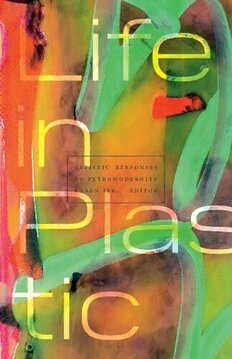
Life in Plastic: Artistic Responses to Petromodernity PDF
Preview Life in Plastic: Artistic Responses to Petromodernity
Life in artistic responses to petromodernity Plas caren irr, editor tic Life in Plastic [This page left intentionally blank.] Life in Plastic Artistic responses to petromodernity Caren Irr, Editor University of Minnesota Press Minneapolis London This project has benefited from support from the Theodore and Jane Norman Fund at Brandeis University. Excerpts from Craig Santos Perez, “The Age of Plastics,” Big Energy Poets: Ecopoetry Thinks Climate Change, ed. Heidi Lynn Staples and Amy King (Kenmore, N.Y.: BlazeVOX, 2017), reprinted with permission. Excerpts from Orchid Tierney, ocean plastic (Kenmore, N.Y.: BlazeVOX, 2019), reprinted with permission. Excerpts from Divya Victor, “Countertranslation,” The Margins: Asian American Writers’ Workshop (November 1, 2018), https://aaww.org/ the-age-of-plastic/, reprinted with permission. Excerpts from Jennifer Cooke, “Second Hand,” The Other Room Anthology 4, ed. James Davies, Tom Jenks, and Scott Thurston, reprinted with permission. Excerpts from Styrofoam by Evelyn Reilly (New York: Roof, 2009), reprinted with permission. Copyright 2021 by the Regents of the University of Minnesota All rights reserved. No part of this publication may be reproduced, stored in a retrieval system, or transmitted, in any form or by any means, electronic, mechanical, photocopying, recording, or otherwise, without the prior written permission of the publisher. Published by the University of Minnesota Press 111 Third Avenue South, Suite 290 Minneapolis, MN 55401- 2520 http://www.upress.umn.edu isBn 978-1-5179-0987-1 (hc) isBn 978-1-5179-0988-8 (pb) Library of Congress record available at https://lccn.loc.gov/2021023173. Printed in the United States of America on acid- free paper The University of Minnesota is an equal- opportunity educator and employer. Contents Acknowledgments vii Introduction: Concepts and Consequences of Plastic 1 Caren Irr and Nayoung Kim I. The Plastic Sensorium 1 “Paper or Plastic?” and Other Conundrums of 11 Environmental Change W. Dana Phillips 2 Smelling Polyester 31 Paul Morrison 3 The Album Era 59 Loren Glass 4 The Plastic You: Plastination and the Postmortal Self 77 Jane Kuenz II. The Plasticity of Genre 5 Plastic Man and Other Petrochemical Fantasies 97 Daniel Worden 6 Organic Form, Plastic Forms: The Nature of Plastic 115 in Contemporary Ecopoetics Margaret Ronda 7 On the Beach: Porous Plasticity, Migration Art, 137 and the Objet Trouvé of the Wasteocene Maurizia Boscagli III. Plastic’s Capitalism 8 “Refuge of Ignorance”: A Prehistory of “Plastic” 165 Crystal Bartolovich 9 The Petrochemical Unconscious: Destructive 181 Plasticities in Richard Powers’s Gain Christopher Breu 10 The Impossible Figure of Oceanic Plastic 199 Sean Grattan IV. Postplastic Futures? 11 From Protoplastics to the Plastiglomerate: 217 Science Fiction’s Shifting Synthetic Sensibilities Lisa Swanstrom 12 Futures in Plastic: Science Fiction, Climate Change, 239 and the New North Phillip E. Wegner 13 Plastic’s “Untiring Solicitation”: Geographies of Myth, 259 Corporate Alibis, and the Plaesthetics of the Matacão Jennifer A. Wagner- Lawlor Contributors 281 Index 283 Acknowledgments This collection would not have been possible without a great deal of camaraderie and assistance. I would especially like to thank Na young Kim, a skilled investigator and collaborator, for her invalu- able research assistance. Support of a financial nature was provided by the office of the Dean of Arts and Sciences at Brandeis University. Editorial advice from Jason Weidemann, Danielle Kasprzak, Anne Carter, and Kristine Hunt has been essential to the success of the project. The comments of the external readers guided and encour- aged our contributions in innumerable ways. The many usually anonymous acts of professional generosity involved in comment- ing on another person or group’s work as it develops are essential to scholarly inquiry, and here, as so often, they have substantially improved our work. I wish to dedicate this volume to my mother, Mickey Irr. For de- cades, her Styrofoam sculptures and cassette tape weavings, as well as her enormous stockpile of repurposed yogurt containers and her mysterious collections of plastic binding strips, have helped me en- vision alternative ways of engaging with the physical environment. • vii • [This page left intentionally blank.] Introduction Concepts and Consequences of Plastic Caren Irr and Nayoung Kim One of the many terrible ironies of the COVID- 19 pandemic is the vast increase in plastic waste that it has triggered. Anxiety about vectors of transmission of the coronavirus led almost immediately to bans on reusable containers and shopping bags in favor of plastic items. Personal protective equipment (PPE) frequently consists of single- use gloves, gowns, and masks that are made from plastics, briefly employed, and immediately sent to the trash. From take- out containers and water bottles to body bags, plastic goods have prolif- erated thanks to the pandemic. As photographers around the world have documented, the resulting waste has rapidly accumulated in landfills and oceans, accelerating the process of environmental deg- radation and habitat loss that launched the virus into human popu- lations in the first place. Abundant use of disposable synthetic materials has taken place despite studies demonstrating that viruses survive on plastic sur- faces far longer than they do on cardboard, cloth, or metal surfaces. Lobbying by the plastics industry certainly plays a role in the rapid resurgence of single- use polymers and suspicion of reusable ma- terials, but the phenomenon also has deeper sources. Plastics are deeply integrated into the cultural imaginary of petromodernity. In a culture and economy defined by its dependence on the energy pro- vided by finite fossil fuels, plastics promise a bright, cheap, and ster- ile perfection that obscures the broken, soggy waste on our shores. From the career opportunity recommended to Mike Nichols’s hero in The Graduate (1967) to the celluloid on which the film narrative • 1 •
